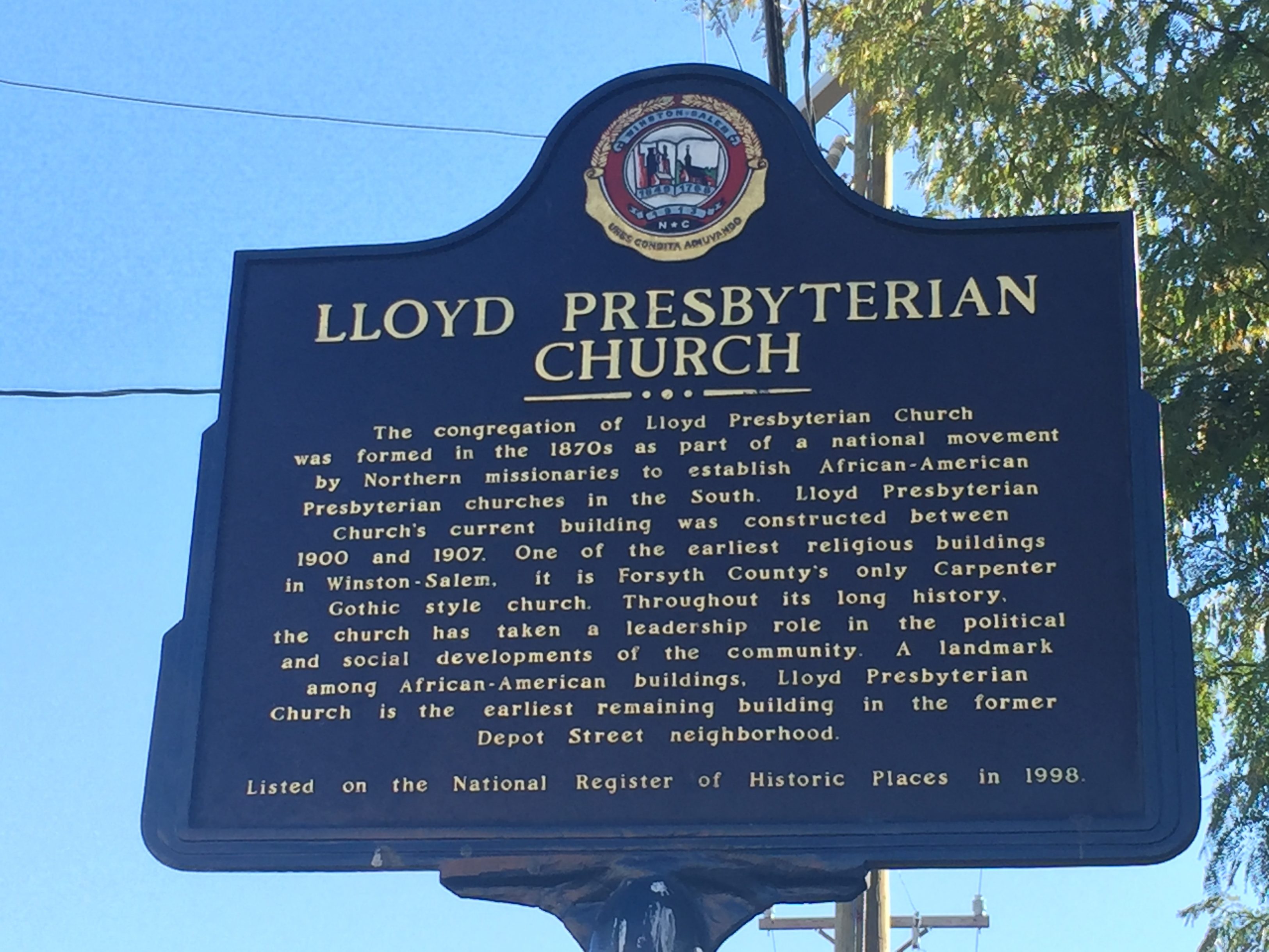Lloyd Presbyterian Church
A table behind the last pew was full of food as the small congregation of 12 began its weekly Sunday worship service at Lloyd Presbyterian Church.
This particular Sunday, the congregation was celebrating the birth of a fellow congregation member’s soon to be new baby. The pews were lined with blue decorations and balloons that read, “It’s a Boy!” and the back table was set with a feast to celebrate the upcoming birth.
In downtown Winston-Salem, a white clapboard, Gothic Revival styled church is hidden among a once thriving tobacco city full of converted factories and new construction sites. The church sits at the end of newly re-developed North Chestnut Street.
Lloyd was founded in 1870 right after the Civil War as a community church for African Americans in the area, according to historian Dr. Adelaide Fries in her book, Forsyth: The History of a County on the March.
Members of Lloyd clapped, cheered, and sang in full worship of God last Sunday, while the Rev. Laura Spangler preached and read excerpts from the Bible.
“The church originally was a place for African Americans to come and worship on their own because after the Civil War there still was not, uh how do you say, equal opportunity in the churches. They wanted a place where they could come and worship God and teach their children the word of God,” said Spangler.
Spangler has been serving as pastor at Lloyd Presbyterian since 1997. She graduated from Davidson College and then Duke Divinity School. Spangler, who is white, is in the minority at the predominantly African-American church, but does not let that define her place among the members.
Lloyd has been a place of bringing people together. Despite the fact Lloyd began as a church for African-Americans, it is now a place for all people.
“We are a church that tries to bring an interracial presence for blacks and whites and any other nationality that wants to join us,” said Spangler, “We’re kinda the bridge between east and west Winston, and we’re a place where black and white feel comfortable. Ya know, I’ve been here for 20 years as a white woman and I just feel really loved”
And even beyond race, the church serves a variety of community members. Throughout the history and development of downtown, Lloyd has served as a gathering place for social justice. During the Civil Rights Era community members would gather in Lloyd and train in nonviolence. Farm workers would meet in the church to discuss negotiations with the Reynolds foundation.

Historic landmark sign standing outside Lloyd Presbyterian Church
One of the ways Lloyd stays involved with the community is through its prayer for the city every Wednesday. The group will start the prayer for the city with scripture and then will move into praying for specifics such as the mayor, government leaders, city council, schools, healthcare, businesses, parents, and homes.
“People just bring what is on their hearts,” said Spangler.
“It is spontaneous,” said Rachel Jackson, an involved member of the congregation, and a member of the Ruling Elders, a long-served tradition of many local Presbyterian congregations. This group serves the congregation by being the government of the church and is led by one particular Clerk of Session.
Lloyd used to provide a shelter in its basement for homeless people. Spangler still identifies the church as being like a shelter for those in need by providing resources for finding jobs, shelter, and food.
“We try to meet both spiritual and physical needs, the whole person. So, we often have food, as well as this spiritual food. We wanted to be grounded in the Bible, the word of God,” she said while clutching her Bible.
A challenge for Lloyd is the diminishing number of active congregation members. What used to be a thriving congregation of up to 200 members is now a group of 25, or even less since the full-time pastor left in 1968.
“The congregation has been about the same if not mildly growing, or it has always been about the same since I’ve been there,” said Michael Sloan, a professor of Classical Languages at Wake Forest University, who also spends time volunteering at Lloyd as a part-time pastor.
What it lacks in size can be compensated by community. During Sunday worship each member wishes each other member peace and supports them with either a hug or handshake. Every new member or visitor brings themselves in front of the congregation to introduce themselves.
Purity Ruchugo, Clerk of Session, turned to her fellow members and said, “Peace be with you” during this last Sunday worship, while embracing them each with a hug.
Spangler ensures that the congregation has a voice and their concerns can be heard on a variety of topics, including tense political climates.
“We lift up politics into the realm of God. And so, we want to create an open climate where if someone has a particular concern about something they can speak about it,” she said. “We don’t have a strict separation between religion and politics, but we try to deal with it within the context of prayer particularly.”
Lloyd does take risks. In the 80s and 90s, the church served as a gathering space for those trying to prove Darryl Hunt’s innocence after he was wrongly convicted of the murder of Deborah Sykes in 1984.
“We prayed and hosted and allowed people to have meetings here even though it was not popular. This Church took a big risk to host that gathering,” Spangler said.